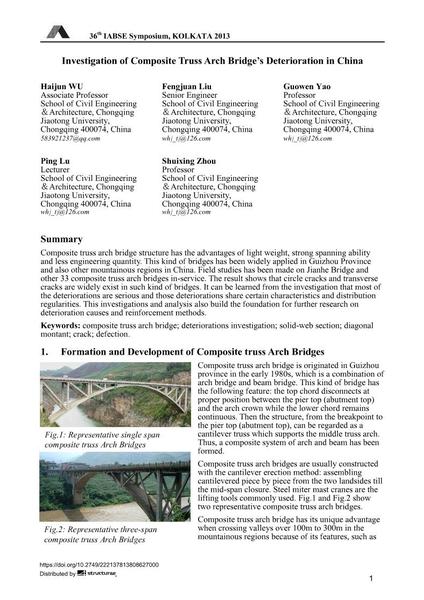Investigation of Composite Truss Arch Bridge's Deterioration in China

|
|
|||||||||||
Bibliografische Angaben
| Autor(en): |
Haijun Wu
Fengjuan Liu Guowen Yao Ping Lu Shuixing Zhou |
||||
|---|---|---|---|---|---|
| Medium: | Tagungsbeitrag | ||||
| Sprache(n): | Englisch | ||||
| Tagung: | IABSE Symposium: Long Span Bridges and Roofs - Development, Design and Implementation, Kolkata, India, 24-27 September 2013 | ||||
| Veröffentlicht in: | IABSE Symposium Kolkata 2013 | ||||
|
|||||
| Seite(n): | 1-7 | ||||
| Anzahl der Seiten (im PDF): | 7 | ||||
| Jahr: | 2013 | ||||
| DOI: | 10.2749/222137813808627000 | ||||
| Abstrakt: |
Composite truss arch bridge structure has the advantages of light weight, strong spanning ability and less engineering quantity. This kind of bridges has been widely applied in Guizhou Province and also other mountainous regions in China. Field studies has been made on Jianhe Bridge and other 33 composite truss arch bridges in-service. The result shows that circle cracks and transverse cracks are widely exist in such kind of bridges. It can be learned from the investigation that most of the deteriorations are serious and those deteriorations share certain characteristics and distribution regularities. This investigations and analysis also build the foundation for further research on deterioration causes and reinforcement methods. |
||||
| Stichwörter: |
Riß
|
||||

